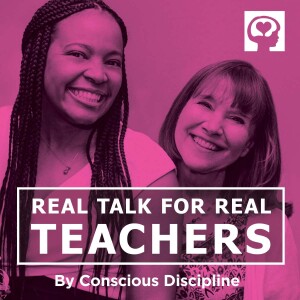
How To Coach Your Peers With Less Resistance and More Success
 2018-06-28
2018-06-28
Download
Right click and do "save link as"
Peer coaching is a powerful way for teachers to pay it forward. Whatever you offer to others, you strengthen in yourself. As a peer coach you learn to listen nonjudgmentally, notice successes, and celebrate them. As you share your skills and talents, you learn to be more conscious and intentional in your own life.
Sometimes, though, there’s a lack of willingness to coach or be coached. This is the result of fear: fear of not knowing what we’re doing, fear of being perceived as a know-it-all, fear of being judged or becoming judgmental, etc.
In this episode, Becky Bailey and special guest Alissa McGraw discuss how to overcome common obstacles to peer coaching. Alissa is a 14-year veteran teacher who started out as the only teacher practicing Conscious Discipline at her elementary school. Now, she hosts twice monthly voluntary meetings attended by administrators, counselors, and 25-30 teachers. Listen as Alissa describes her transformative peer coaching process, including how to build connections and foster collaboration.
Essential Takeaways
• Peer coaching is a “win-win” for all involved. The best way to learn something is to do it yourself, then teach it to others. Teaching others encourages reflection and self-discovery.
• Limiting beliefs about ourselves sometimes decrease our willingness to coach or be coached. Remember that sharing your gifts in no way discounts the gifts of others.
• The peer coaching process can include answering questions, modeling, observing other teachers and being observed by others. You may also want to conduct voluntary meetings or book studies with interested teachers.
• The classroom is a “sacred space” for many teachers. For peers to be comfortable inviting you into their classrooms, it’s essential that you build authentic connections.
• Transformational change can’t be forced; it must be inspired. Work with the teachers who are willing and give time and space to those who aren’t.
Steps for Tomorrow
• Start off slow. Send out emails to gauge interest, consider hosting voluntary meetings, and express a willingness to visit classrooms or invite others into your classroom.
• Get your students involved in the coaching process. Have them read Shubert books to younger children or model structures like the Brain Smart Start and the Time Machine.
• Live it! Be the person you want others to become. Share your journey openly with others and build connections that pave the way for collaboration.
Important Links
• ConsciousDiscipline.com
• Brain Smart Start
• Noticing
• Kindness Recorder
Product Mentions
• Time Machine
• Safe Place
• Shubert Books
Show Outline
:20 What is Conscious Discipline?
:54 The power of paying it forward
2:20 Addressing the limiting beliefs that keep us from coaching/being coached by peers
4:55 Introduction of guest Alissa McGraw
6:28 Impact of Conscious Discipline
9:30 Using Conscious Discipline with older students
12:25 Getting into peer coaching
13:40 Sharing Conscious Discipline with peers through voluntary meetings
14:08 Evolution of Alissa’s monthly meetings
15:15 Relationship building and its impact on peer coaching
16:50 Alissa’s coaching process
18:20 The role of administrative support in peer coaching
19:35 Story of a support teacher’s success with noticing
22:30 Responding to peer teachers who are not willing
25:10 Three tips for teachers considering peer coaching
27:50 What’s Becky up to?
THANK YOU FOR LISTENING
There are many ways you could have spent this time today, but you chose to spend it with me and I am grateful. If you enjoyed today’s show, please share it with others via your favorite social media platforms.
Also, would you consider taking 60-seconds to leave an honest review and rating for the podcast on iTunes? Your feedback is extremely helpful when it comes to the ranking of the show and I love to hear your feedback! Also, don’t forget to subscribe to the podcast on iTunes, to get automatic updates every time a new episode goes live!
On behalf of our Conscious Discipline family, we wish you well.
view more
More Episodes
01245678910111213141516171819
Create your
podcast in
minutes
- Full-featured podcast site
- Unlimited storage and bandwidth
- Comprehensive podcast stats
- Distribute to Apple Podcasts, Spotify, and more
- Make money with your podcast
It is Free
- Privacy Policy
- Cookie Policy
- Terms of Use
- Consent Preferences
- Copyright © 2015-2024 Podbean.com






